A tour of Vector Space Systems
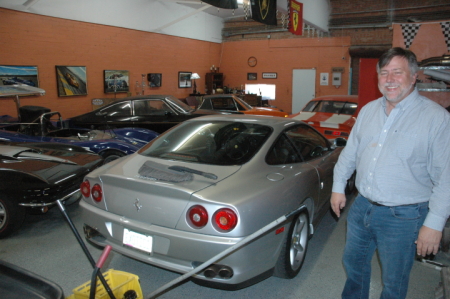
[UPDATE: I have been informed by Vector’s PR department that they have recently changed the company’s name, dropping “Space Systems” from the title. I can’t really change the title here, but I thought I note this fact for my readers.]
Today I got a quick tour of Vector Space System’s very blue collar but active rocket factory in Tucson, Arizona. My tour guide was Jim Cantrell, the CEO of the company.
Cantrell, shown on the right in front of one of his side businesses fixing and refurbishing race cars and rare luxury sports cars (also located in this factory), started out with a love of race cars, which he still builds and races. As he said to me, “Long endurance car racing is still my thing.”
However, he has also spent his life in the space business. He has worked for government agencies and numerous private businesses, including SpaceX at its very beginning. Vector Space Systems is an effort put together by him and several other people to capture the smallsat market, a market he truly believes is going to explode with activity in the coming years. If things go as he wishes, they hope to launch at least one hundred times a year, from multiple launch sites. Their goal is simplicity and quick turnaround at an inexpensive cost.
The company is presently in the testing phase leading up to their first orbital launches, which they hope to start in 2018. Right now they are building a series of full scale versions of their Vector-R rocket with a dummy second stage. The idea is to do a string of suborbital test flights, the first of which will fly in about a week from Mohave in California, with the second flying from the Georgia spaceport in Camden County. The image below is the first stage of that first test rocket.
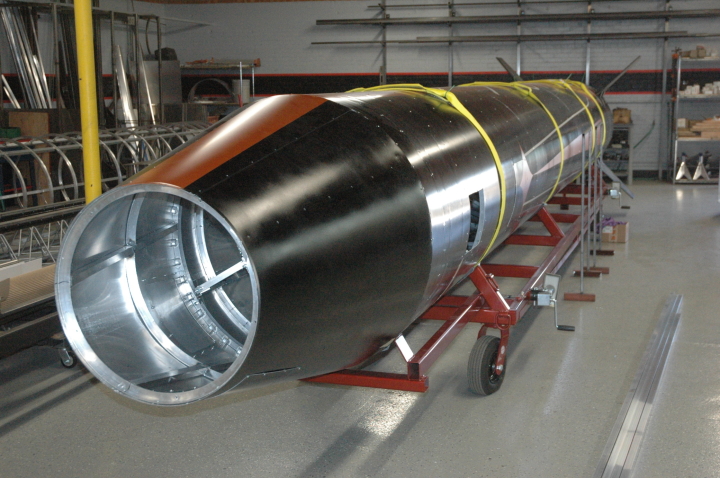
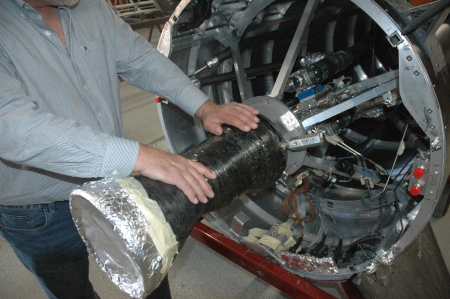
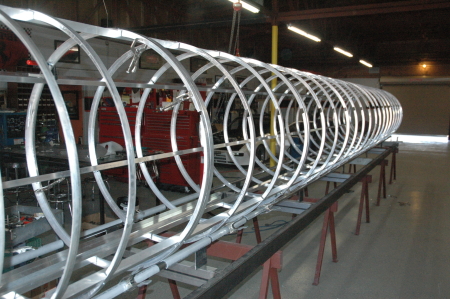
For this flight their main goal is to test the engine, which Cantrell is showing me in the picture to the right. I was astonished at how small and simple the engine was. In fact, the rocket itself was amazingly small. It looked like it could almost fit inside a typical moving truck.
Below and to the right is the first stage for their second test flight, presently being assembled. They hope it will be ready for flight in only a few weeks after the first flight. They plan five suborbital test flights, with the last capable of getting about 90% to orbit. Along the way they will test their avionics, the rocket’s balancing systems, and its computer and tanks. Once these tests are complete they will then move to testing the orbital version in 2018.
Obviously, all this depends on every test flight being successful. But then, even if something goes wrong they will learn something and move on. For example, they recently transported an engineering version of the rocket to the visitor center at Kennedy. As Cantrell explained, “We learned things new just making that move.”
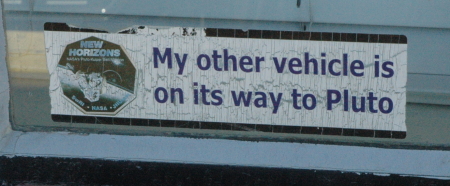
In the end, I think the bumper sticker to the right, attached to the window of Vector Space System’s office, sums everything up. The people at Vector want to make money in space, but they — like everyone in the space business — also love making rockets and engines and going fast. What better combination from life could you ask for?
On Christmas Eve 1968 three Americans became the first humans to visit another world. What they did to celebrate was unexpected and profound, and will be remembered throughout all human history. Genesis: the Story of Apollo 8, Robert Zimmerman's classic history of humanity's first journey to another world, tells that story, and it is now available as both an ebook and an audiobook, both with a foreword by Valerie Anders and a new introduction by Robert Zimmerman.
The ebook is available everywhere for $5.99 (before discount) at amazon, or direct from my ebook publisher, ebookit. If you buy it from ebookit you don't support the big tech companies and the author gets a bigger cut much sooner.
The audiobook is also available at all these vendors, and is also free with a 30-day trial membership to Audible.
"Not simply about one mission, [Genesis] is also the history of America's quest for the moon... Zimmerman has done a masterful job of tying disparate events together into a solid account of one of America's greatest human triumphs."--San Antonio Express-News


Nice trip report, Robert.
Unlike the last time everyone thought that the small satellite business was ready to take off, back when Lockheed designed their Athena rocket for that market, this time small satellites have already shown their worth, and there are many companies that have plans to fly small satellites. Cubesats are especially popular. I think that Cantrell’s timing is right, and I wish him luck and clear skies.
It is rather amazing how many startup space companies are started by veterans of SpaceX and other relatively new space companies. It is almost as though startups are incubating other startups.
Any chance on a similar report from Bigelow?
While talking about suggestions, I heard David Livingstone ask a guest a week ago if there were any commercial mission elements on the Skylab, and the author of a book on Skylab said that he didn’t know of any. Maybe a look into the history of commercial space is a neglected but now very hot subject? Beginning with the private efforts of Goddard and von Braun’s Verein für Raumfahrt I suppose.
http://www.thespaceshow.com/show/21-mar-2017/broadcast-2887-dwight-steven-boniecki
I first heard you talk about Vector on the John Batchelor Show. I love what their doing.
Thanks Bob for all your efforts. My interest in space has increased feverishly since learning of you and your website.
Robert,
How does Vector explain that they can soon launch from Camden County Georgia when Camden’s Draft EIS has not been released by the FAA? At the earliest, the site cannot be approved until early to mid 2018, then Camden or their “private” partner will have to gain an operator’s license and then, I suppose, an experimental launch license.
Since Spaceport Camden will be within 8 miles of 40% of the US Ohio-class ballistic missile submarine fleet and their nuclear weapons at Kings Bay exactly how will Vector get from their amateur unguided rocket capability to something the US Navy will allow to be launched so nearby? Have they demonstrated a self-destruct system that will be allowed over Cumberland Island National Seashore which lies <4 miles down-range and directly under ANY possible trajectory?
And since Vector uses a parachute recovery system, how do they expect to recover any components that land in the down range National Wilderness where not even a bicycle is allowed? Or from the immediately adjacent intercoastal waterway or Atlantic Ocean just 8 miles down range? There are perhaps 25 calm wind days here a year. Any onshore wind will blow their parachute back towards Jekyll Sound, the Sidney Lanier Bridge, Jekyll Island, the City or Port of Brunswick, or populated neighborhoods just 3 to 10 miles from the spaceport. And is Vector financially capable of buying the required insurance since Camden, if their license is granted, will be the first US site to allow launches over permanent populations, a National Park that has hikers, campers, several day visitors, wilderness forest, and registered historic sites making Camden the most expensive site in the world to launch from? Everyone who will be evacuated will have a cost and compensation associated with them.
Frankly, Vector's hardware is the easiest part of their plans. I have an engineering background and I can say that the assembly fitting technique shown in your picture is not going to cut it at 3-4 G's and the fit between the frame and the skin in the nose cone is questionable. All those variables will require very sophisticated guidance. Your picture shows a single engine, but their Vector-R has 3 engines. I suspect the next series of launches will be a slightly larger version of the unguided amateur P20 rocket we've seen before so what are they calling it? Wouldn't you think that their timeline is significantly hyped unless they get a gigantic amount of new investment, bigger staff, and better manufacturing techniques?
Perhaps a lot of Vector's hype is because Rocket Labs is soon to clean their clock if their first Electron launch is successful?
I am skeptically about Vector Space Systems (VSS) real development advancement/achievement. The comparison to Rocketlab shows the difference. They seem have not achieved required investment, workforce and development status as Rocketlab did it (see last invest round of 75 million dollar), which, btw, also owns the much superior engine technology in terms of performance.
It is my impression that VSS works at large and present only with mock-ups, sub-scale rocket tests and a few full-scale single engine tests up to now, in order to find investors and money. You have to be no genius to predict that project failure caused by not sufficient financed development effort is quite probable.